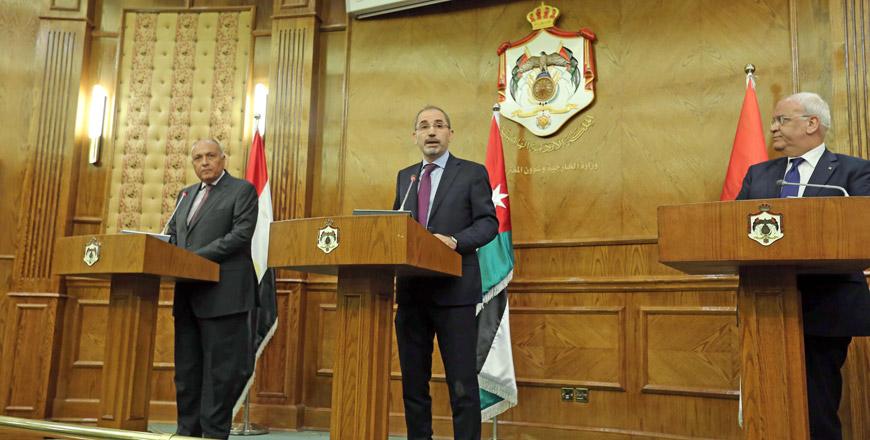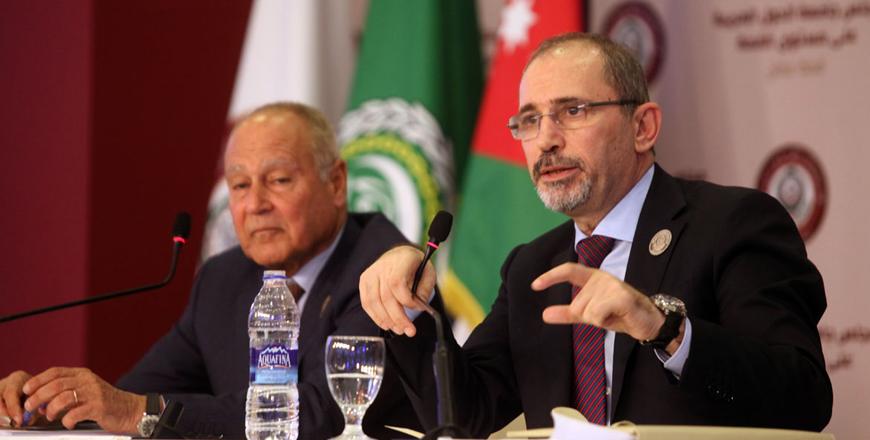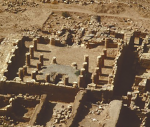You are here
Jordan, Egypt, Palestine reiterate commitment to Mideast peace
By Dana Al Emam , Petra - May 14,2017 - Last updated at May 14,2017

Foreign Minister Ayman Safadi, Egyptian Foreign Minister Sameh Shukri and Saeb Erekat, PLO’s executive committee’s secretary and chief Palestinian negotiator, during a press conference in Amman on Sunday (Petra photo)
AMMAN — Jordan, Palestine and Egypt on Sunday reiterated their commitment to the two-state solution as the only solution to the Palestinian-Israeli conflict, expressing keenness to cooperate with the US administration in this regard.
Foreign Minister Ayman Safadi met in Amman with his Egyptian counterpart Sameh Shukri and Saeb Erekat, Palestine Liberation organistaion’s executive committee’s secretary and chief Palestinian negotiator to discuss future steps regarding the peace process, a "priority issue" for the region, Safadi told the reporters.
During a joint press conference following the meeting, in which the officials reiterated the principles they agreed on in their meeting, the foreign minister highlighted the three countries' commitment to achieving peace as a strategic option, as all Arab states have reaffirmed in the Arab Peace Initiative during the 28th Arab summit recently held in Jordan.
Discussions also included efforts to end the political stalemate by resuming "serious and effective" negotiations to solve the Palestinian-Israeli issue based on the two-state solution.
The officials highlighted the outcomes of the recent visits of His Majesty King Abdullah, Egyptian President Abdel Fattah Al Sisi and Palestinian President Mahmoud Abbas to the US, commending the "positive and constructive" discussions with US President Donald Trump on the importance of forging a peaceful solution to the Palestinian-Israeli conflict.
"We all value the obvious and solid commitments that President Trump has made to ensure progress in the resolution of the Palestinian-Israeli conflict…We are ready to do whatever it takes to help push the process forward," Safadi said.
The three officials agreed that the Palestinian-Israeli conflict constitutes the basis of turbulence in the region, noting that solving it through negotiations that ensure security and peace for both Palestinians and Israelis is a prerequisite to achieving regional stability.
The meeting also addressed the issue of the 1,500 Palestinian prisoners on hunger strike in Israeli jails and underlined the need for Israel to respond to their "humanitarian and just demands" in line with the international law and Geneva accords.
They also went over other regional issues, including the fight against terrorism.
"We are committed to doing everything we can, in cooperation with the international community, to neutralise this danger, which we consider as a common threat that we all have an interest in defeating in defence of our shared human values and political security," Safadi said.
For his part, Shukri expressed his country’s keenness on reaching a peaceful and comprehensive solution to the Palestinian-Israeli issue, within several Arab frameworks that include the Arab Peace Initiative Committee and the Arab ministerial committee tasked with ending the Israeli occupation of Palestinian lands.
He added that officials of the three countries will continue to coordinate efforts to achieve peace.
Erekat stressed that Jordan and Egypt are key partners of the Palestinians, and that the two countries are involved in all issues related to the Palestinian-Israeli conflict, including all final-status ones.
“We seek peace and we hope that the peace process would have the chance it deserves,” he said, noting that Israel’s continuous building of settlements on Palestinian lands is an act that is prone to undermine the two-state solution.
He stated that there is no Palestinian state in Gaza currently, yet the envisioned state must have the coastal strip as an integral part of it.
“I hope that they [the Israelis] will choose peace,” he noted, highlighting peace as a higher interest for the Palestinians, as well as an interest for the Israelis and the Americans.
Safadi, Shukri and Erekat affirmed their keenness to continue the dialogue and communication among each other and the rest of Arab countries, agreeing to meet again in Cairo and after that in Palestine.
They also suggested that Safadi, in light of Jordan’s presidency of the most recent Arab summit, contact the members of the committee to follow up on the Arab Peace Initiative to coordinate action towards peace efforts.
Related Articles
AMMAN — Foreign Minister Ayman Safadi on Saturday reiterated Jordan's support to brotherly Palestinians' legitimate rights — paramount of wh
AMMAN — Foreign Minister Ayman Safadi on Wednesday held a meeting with EU foreign policy chief, Federica Mogherini, Egyptian Foreign Ministe
AMMAN — Foreign Minister Ayman Safadi on Sunday met Secretary of the Central Committee of the Palestine Liberation Organisation Saeb Erekat



















